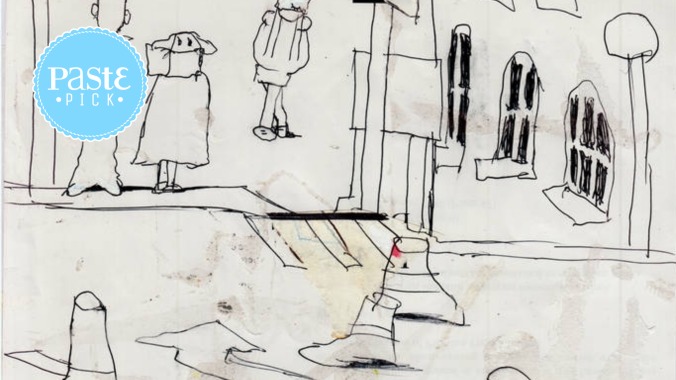Fievel is Glauque Make Joy Delightfully Anachronistic on Rong Weicknes
The Brooklyn/Brussels jazz-pop outfit’s second full-length album is the sound of music fanatics mashing together textures or influences that thrill them.

It should sound like it weighs enough to destroy if not handled carefully. The artist themselves presents a few vignettes as context, the first of which is London legend Guy Stevens swinging chairs around the studio as The Clash record the song “The Card Cheat” twice—one track over the other—in an attempt to manually double-track the sound, building something unruly and grand. The second is the sound of 60s band White Noise’s influential psych-pop/sound collage album An Electric Storm, which meticulously pieces together surreal sound effects on tape to take the shape of a pop song.
While London Calling and An Electric Storm are far from “difficult” listens, the fact that Zach Phillips—bandleader of Brooklyn/Brussels jazz-pop outfit Fievel is Glauque—cited those two examples to demonstrate how they made their second full-length album feels specific and intentional. The miracle is that Rong Weicknes, the album in question, feels grand without demanding its listener know or investigate what it’s referencing. While other indie maximalists build museum pieces to be talked about as much as they’re listened to (which certainly have their place), Fievel is Glauque operate in purely ephemeral territory. To confine movement or thought to a single channel appears to be the antithesis of their mission.
The band, centered around the New York-based Phillips and Belgium-based vocalist Ma Clément, took an intense approach in their recording process with eight other musicians, following Strummer/Jones and Co. by layering two straight-forward takes of each song before adding an improvisatory take on top of it. This method of recording can sound dubious if you’ve been charmed by the band before. With the two primary members having met by accident, everything about their partnership up to this point has thrived on spontaneity—after all, this is their first project where they’ve had longer than 24 hours to record. As such, their first collection of songs, God’s Trashmen Sent to Right the Mess, and their official debut, 2022’s Flaming Swords, are stuffed to the brim with songs that rarely breach the two-minute mark, but sparkle with personality even in their bare bones form.
By comparison, you’d expect a more intentional process to weigh down or clutter the formula. Yet, what the band does instead is perfect a balancing act, taking advantage of the broader canvas they have to work with, only expanding the distinct lane Fievel is Glauque has carved out for itself. A delightfully anachronistic quality shines throughout in its everything-but-the-kitchen-sink approach, teasing out quirks which would be smoothed over in the tradition of lounge-friendly jazz-pop they seek to embellish and update. The opening one-two punch of “Hover” and lead single “As Above, So Below” feel emblematic of this effect, never feeling stuffy or like Phillips and Clément are looking over their shoulder and waiting for recognition to flash in your eyes. It’s the sound of music fanatics mashing together textures or influences that thrill them—creating a refreshing, contagious sense of joy.
-

-

-

-

-

-

-

-

-

-

-

-

-

-

-

-

-

-

-

-

-

-

-

-

-

-

-

-

-

-

-

-

-

-

-

-

-

-

-

-








































